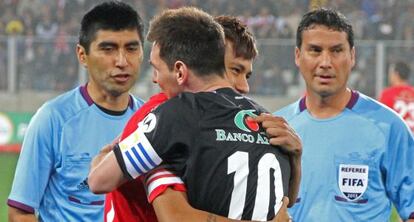Civil Guard investigating possible tax fraud in staging of Messi charity matches
Officers find transfers worth almost €1m sent to “G. Marín-Messi” in Caribbean offshore haven

A series of charity matches involving Barcelona soccer star Lionel Messi that took place in six countries – including the US, Mexico and Peru, in 2012 and 2013 – is under the judicial spotlight. The Civil Guard’s UCO organized crime unit is investigating five bank transfers of almost €1 million from the organizers of at least two of the events that ended up in a company based in the tax haven of Curaçao in the Dutch Caribbean.
The official receipts for the transfers contain handwritten notes suggesting the payees of the money were “G. Marín-Messi.” Guillermo Marín is the family friend and head of Argentinean company Imagen Deportiva whom Messi entrusted with managing his series of Los Amigos de Messi contra el resto del mundo (or, Messi’s friends versus the rest of the world) charity games.
A Madrid court has opened money-laundering and tax-fraud proceedings into the matches. The investigation, which is unrelated to the complaint recently filed by the Spanish Tax Agency against the Argentinean player for concealing income from his image rights, revolves around an alleged Colombian plot that, in cahoots with Spanish citizens, might have used the charity games to launder drug money. Early inquiries suggest that even though the matches were publicized as charity events, the players who participated in them received payment for their services, and some of these payments were sent to Curaçao.
The five bank receipts that confirm the destination of the payments were sent to the Civil Guard by Colombian company Total Conciertos, which organized the Los Amigos de Messi ... match in Bogotá (Colombia) on June 21, 2012. They show that the company sent a total of $1.37 million (€950,000) to an account held by Mandatos Velineg SRI at the First Caribbean International Bank in Curaçao. The five transfers coincide with the dates of the charity matches held in 2012, say investigation sources. Handwritten notes in the top left-hand corner show the words: “payment G. Marín-Messi,” and the respective amounts.
Both Messi and his father, Jorge Horacio Messi Pérez, have already been questioned by the Civil Guard as witnesses in the investigation. They admitted they had a relationship with Marín and that he managed the matches, but both denied making any personal profit from them. Several of Messi’s Barcelona teammates who took part in the games – including Dani Alves, Javier Mascherano and José Manuel Pinto – have also denied making money from the events, though admitted their travel and accommodation were provided for.
But the five bank receipts handed over to the Civil Guard by Total Conciertos’ Spanish lawyer suggest there were payments to players, including Messi himself. From the documents, the Civil Guard has concluded that the Curaçao account, invisible to tax collectors, may belong to Messi himself or Marín.
The Messi charity matches have been surrounded by controversy after the supposed beneficiaries of the events reported that the proceeds never reached them. The games were played in 2012 and 2013 in Cancún and Quintana Roo in Mexico; Bogotá and Medellín in Colombia; Lima in Peru; and Los Angeles and Miami in US. Messi’s father Jorge Horacio Messi Pérez said some of the money from the Bogotá game was destined for the Lionel Messi Foundation and through that to Unicef Colombia.

But the Civil Guard’s UCO unit has doubts over this claim and the real destination of the money made from the games. No one has yet to be targeted as an official suspect in the proceedings as the investigation is still in its early stages, but so far three people are under the spotlight: Guillermo Marín and the president and vice-president of Total Conciertos, Harigsson González and Andrés Barco, respectively.
Barco is the presumed head of the alleged money-laundering plot. Based on statements by witnesses and the organizers of the events, the Civil Guard believes he handed “Guillermo Marín $4 million” to manage the games and cover all the players’ travel and accommodation expenses, as well as additional payments for playing. Several witnesses have said there were conversations about these payments in which they are alluded to as “four melons” and that two of those melons would supposedly end up in the hands of Messi.
Weeks after the match, Barco said the players had been paid for their services and also admitted that money was still owed to the beneficiary foundations. Both he and González have denied any links to drug traffickers.
The Civil Guard has requested judicial permission to open new proceedings and clear up who is behind the accounts. Given the quantities involved – almost €1 million – whoever is could be guilty of financial crimes.
Tu suscripción se está usando en otro dispositivo
¿Quieres añadir otro usuario a tu suscripción?
Si continúas leyendo en este dispositivo, no se podrá leer en el otro.
FlechaTu suscripción se está usando en otro dispositivo y solo puedes acceder a EL PAÍS desde un dispositivo a la vez.
Si quieres compartir tu cuenta, cambia tu suscripción a la modalidad Premium, así podrás añadir otro usuario. Cada uno accederá con su propia cuenta de email, lo que os permitirá personalizar vuestra experiencia en EL PAÍS.
¿Tienes una suscripción de empresa? Accede aquí para contratar más cuentas.
En el caso de no saber quién está usando tu cuenta, te recomendamos cambiar tu contraseña aquí.
Si decides continuar compartiendo tu cuenta, este mensaje se mostrará en tu dispositivo y en el de la otra persona que está usando tu cuenta de forma indefinida, afectando a tu experiencia de lectura. Puedes consultar aquí los términos y condiciones de la suscripción digital.








































